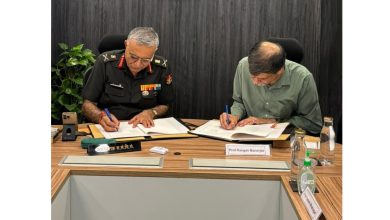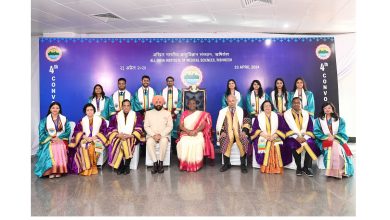India will make significant investment in R&D in vaccine development for future pandemic: Dr Jitendra Singh

Dr Singh was speaking at two-day international meet on “Preparedness for Future Epidemics: Is India ready to meet the CEPI 100 days vaccine challenge?”
Union Minister of State (Independent Charge) Science & Technology, Dr Jitendra Singh said, India will make a significant investment in R&D to develop a roadmap for the design and delivery of vaccine development for a future pandemic.
In his message to the two-day international meet on “Preparedness for Future Epidemics: Is India ready to meet the CEPI 100 days vaccine challenge?” Dr Jitendra Singh said, while efforts are still on to uncover findings about COVID-19 and the epidemiological models, India is ready to invest in future challenges.
The conference has been organised by the Translational Health Science and Technology Institute (THSTI), an autonomous institute of the Department of Biotechnology (DBT), Ministry of Science and Technology, Faridabad on its campus at NCR Biotech Science Cluster.
Singh said, the Department of Biotechnology was at the centre of the pandemic response and took unprecedented steps to curb the threat posed by COVID-19. He said, DBT was aided very ably, by its 14 autonomous institutes, the primary lead taken by THSTI as it quickly set up patient cohorts, bioassay systems, immune and cellular response assays, animal studies required for vaccine development, and supported the vaccine industry in developing India’s first DNA and protein subunit vaccine Corbevax.
Dr Singh reiterated that COVID-19 has given an urgent wake-up call to prepare ourselves for any future threat and it is time that the Department of Biotechnology and THSTI leading India’s IndCEPI program for future preparedness.
The meeting brought together leaders and experts from academia, industry and regulators to discuss important aspects of vaccine development for emerging infectious diseases. India as a country will take lead in providing a policy framework for pandemic preparedness especially for the global south, aligning respective national regulatory processes with international processes, and enhancing and pooling manufacturing capacity for large-scale production quickly. This will also help the country to garner the strength of our biotech industry to improve human health and also contribute to our economy beyond its current share of $80 billion.
Dr Rajesh Gokhale, Secretary, DBT, reiterated DBT’s commitment to fostering enterprise and innovation with new and special emphasis on enhancing manufacturing and bio-manufacturing. He added that the process for vaccine preparedness was complex and DBT would facilitate putting into place easier scientific policy on the place. The need for a synchronised system such that India can combat the disease dengue, Chikungunya, TB and other viral/bacterial infection, bringing more proactive solutions in means of vaccines, diagnostics, and curative therapeutics quickly.
Prof Pramod Garg, Executive Director, THSTI highlighted the work that THSTI has been doing in various R&D fields. Dr Garg spoke briefly about the clinical cohorts, vaccine effectiveness studies, pan-hospital network studies, diagnostic modalities and in-house vaccine development research on infectious diseases such as SARS-CoV-2, TB, Dengue, etc. He mentioned the newly launched MSc in Clinical Research program. Prof. Garg also emphasized having synergy between academia and industries and informed the audience that THSTI has recently got $12 million in funding from CEPI for collaborative work on developing pan beta corona vaccine in collaboration with industry. He said that THSTI is ready to meet the academic component of the challenge of developing a new vaccine.
The keynote address was delivered by Prof K Vijay Raghavan, former Principal Scientific Advisor to the Government of India. He spoke about the challenges posed by the CEPI’s 100-Day challenge and the role of public health information and data flow systems, vaccine platforms, preclinical facilities, animal experiments, regulatory systems, implementation systems and funds in pointing out the processes for meeting these critical challenges. He cautioned that while we were lucky to have a strong immunogenic spike protein antigen for the coronavirus, this may not be the case with other infections. Therefore, developing a sustainable and economically viable system flow for achieving100 day challenge was critical.
Dr Soumya Swaminathan, Chief Scientist, WHO emphasised the need for India to develop road maps and target product profiles for diseases important to India. She mentioned that the WHO had set up a committee to prioritize viral families and pick prototypes from these families for vaccine development. For a better and more equitable approach to vaccine development and access, it was important to be collaborative, and have globally aligned regulatory processes and an ethical public health policy in place.




